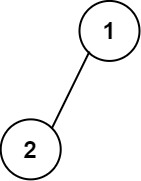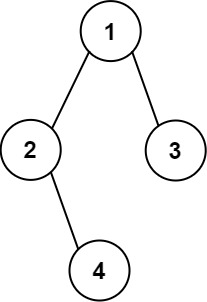655. Print Binary Tree
1. Description
Given the root of a binary tree, construct a 0-indexed m x n string matrix res that represents a formatted layout of the tree. The formatted layout matrix should be constructed using the following rules:
- The height of the tree is height and the number of rows m should be equal to height + 1.
- The number of columns n should be equal to 2height+1 - 1.
- Place the root node in the middle of the top row (more formally, at location res[0][(n-1)/2]).
- For each node that has been placed in the matrix at position res[r][c], place its left child at res[r+1][c-2height-r-1] and its right child at res[r+1][c+2height-r-1].
- Continue this process until all the nodes in the tree have been placed.
- Any empty cells should contain the empty string “”.
Return the constructed matrix res.
2. Example
Example 1:
Input: root = [1,2]
Output:
[["",“1”,""],
[“2”,"",""]]
Example 2:
Input: root = [1,2,3,null,4]
Output:
[["","","",“1”,"","",""],
["",“2”,"","","",“3”,""],
["","",“4”,"","","",""]]
3. Constraints
- The number of nodes in the tree is in the range [1, $2^{10}$].
- -99 <= Node.val <= 99
- The depth of the tree will be in the range [1, 10].
4. Solutions
Depth-First Search
n is the height root
Time complexity: O($n2^n$)
Space complexity: O(n)
class Solution {
public:
vector<vector<string>> printTree(TreeNode *root) {
int height = get_height_(root);
int n = (1 << height) - 1;
vector<vector<string>> result(height, vector<string>(n));
traverse_(root, height, result, 0, (n - 1) >> 1);
return result;
}
private:
int get_height_(TreeNode *root) {
if (root == nullptr) {
return 0;
}
return 1 + max(get_height_(root->left), get_height_(root->right));
}
void traverse_(TreeNode *root, const int height, vector<vector<string>> &result, int i, int j) {
if (root != nullptr) {
result[i][j] = to_string(root->val);
if (i + 1 < height) {
traverse_(root->left, height, result, i + 1, j - (1 << (height - i - 1 - 1)));
traverse_(root->right, height, result, i + 1, j + (1 << (height - i - 1 - 1)));
}
}
}
};